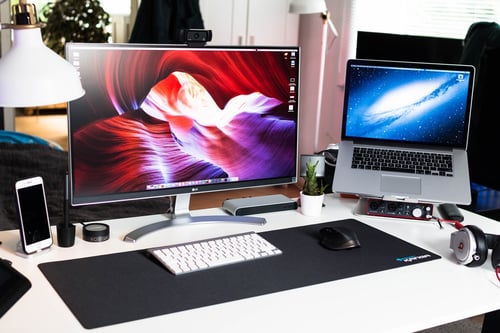
Six common mistakes in online qualitative research - and how to avoid them
Online qualitative market research interviews – whether conducted in individual or group settings - are a great all-round research method that has become increasingly popular in recent years. They’re fast, cost effective and because respondents can take part remotely, they don’t have the geographical limitations of traditional research.
When taking part in online qualitative interviews, users are normally given login details to a secure site where they are interviewed via webcam, with online platforms allowing researchers to share anything from videos and photos to ad concepts with them. The participants are then able to respond via screen annotation, backroom chat functions, video or photo uploads and live polling.
Whilst online sessions are an incredibly effective way to draw insights, they aren’t without their challenges, though. Here are six common slip-ups that we see all-too-frequently that can have a real impact on how successful your research is.
Are you making any of these mistakes? Read on to find out...
1. Too many people, too little time
Gathering thoughtful comments and insights on several topics from multiple people can take quite a bit of time – and the more participants you add to your online focus groups, the more time you’ll need. If you’re not careful about the length of your session, you run the risk of your participants getting bored, especially considering it’s so easy to withdraw when joining in online.
The solution? Keeping your participants engaged at all times and making sure the session doesn’t drag on – two hours is generally a good time limit for a focus group.
For this same reason it’s also a good idea to limit sessions to a certain number of participants so you can keep control as the discussion gathers energy – we’d generally recommend a maximum of six participants in any one session. Not only does this mean you can give them all the attention they deserve, but there are technological considerations to think about, too – for example, some platforms will start having technical issues when there are more than four or five people.
2. Being too scripted
During an online interview, striking the right tone is essential to facilitating an open discussion and natural flow of ideas. It’s pretty difficult to exercise any control if you’re reading from a script rather than responding to comments and ideas as they emerge – and this is even more apparent in online interviews where ideas and conversations move incredibly quickly.
That’s why it’s important to respond to new discoveries as they come up and gently guide the discussion in the right direction to generate the results you need. Instead of having a set script, we recommend creating a discussion guide so you can be sure you cover all the subjects you need to, whilst still ensuring your plan is flexible enough to adapt and change as needed. That way you can make sure you are unlocking those insights and digging out nuggets of information as and when they come up.

3. Not choosing the right moderator
It’s true what they say: a focus group or individual interview is only as good as its moderator. After all, there are so many things to consider – from the need to strike a careful balance between a free-flowing discussion and a structured research session to keeping track of time and asking the right questions at the right time – so it’s no wonder that having an experienced moderator is so important, especially online.
Whether individual interviews or online focus groups, moderators will also need to be fast typists to utilise chat functions, be able to quickly read through responses to check they are relevant as well as formulating follow up questions, too. Not only that, but they will also need to be comfortable in an online setting – and because their personality may be slightly obscured by a computer screen, they must also be able to convey warmth and humour despite all this in order to build a rapport with participants. That’s quite a bit to ask – which is why it’s so important to make sure you choose the right person for the job!
4. Not finding the balance between the ‘must-haves’ and ‘nice-to-haves’
When recruiting participants for online market research, there is a very fine balance when it comes to recruitment criteria. It’s always a trade-off between must-have and nice-to-have criteria: if the criteria are too strict, you could have trouble finding enough participants to take part, whilst if it’s too relaxed you could compromise your results. Not only that, but you also need to consider the added complexity of conducting these sessions online – adding tech savvy to the list might bring your number of potential participants down even further.
If you do need strict criteria for your research such as a participant having used a specific product or service in a specific time frame, make sure you allow ample time for recruitment. Not only that, but you should also consider incentives, too – after all, the more narrow your criteria for participants, the greater incentive you will need to offer in to attract the right people as they will be few and far between.
5. Forgetting the importance of an over-recruit
This might seem a bit of an obvious one, but you’d be surprised how many online sessions we see with no backup plans in place in case of no shows on the day. We can’t stress enough how important it is to over-recruit so you are fully prepared for any eventualities. Your participants are only human, after all – and there are a number of reasons why they could drop out at the last minute, either because they can no longer commit the time or because of technical issues on the day.
An over-recruit allows you to be fully prepared for this, though – and even if you do end up with a full house on the day, you can always send home some of your over-recruits to keep the group at a nice manageable size (remember you still need to pay their incentive though). For online focus groups we recommend the following amount of over-recruits:
- If conducting a duo – recruit 3 for 2 people to attend
- If conducting a trio – recruit 4 for 3 to attend
- If conducting a mini-group – recruit 6 for 4 to attend
6. Getting the software selection wrong
Last but not least, the technical side of things. It’s all very well and good taking your time to find the right moderator and ensuring you have a suitable amount of over-recruits, but at the end of the day if you haven’t got the right software in place then you’re going to struggle to make your online qualitative research a success. That’s why you need to carefully consider which software provider you will choose, from making sure they are secure enough to ensuring the privacy of your participants to choosing a type of software that is easy to use.
Here at Angelfish Fieldwork, we can work with your chosen platform or provide our own, SubVision, to support your online focus group from start to finish. Our software allows you to completely engage with your respondents by sharing ad concepts, graphics, videos or other content, and you can also share your screen or the respondent’s to allow unlimited content types. Not only that, but our system also allows on screen annotation, backroom chat functions, video or photo uploads and live polling, too.

When all is said and done, preparation is the cornerstone of well-run online groups. If you make sure you take the time to choose and test your software, recruit the right people and enlist the help of an experienced moderator who arrives well prepared, you can be pretty sure that your online qualitative research will be a success.
If you would like to find out more about how we can help you to conduct your online focus group, why not contact us to find out more?



-Feb-19-2026-09-59-49-0345-AM.png)


-Jun-11-2025-03-32-03-9584-PM.png?width=500&name=Untitled%20design%20(3)-Jun-11-2025-03-32-03-9584-PM.png)







